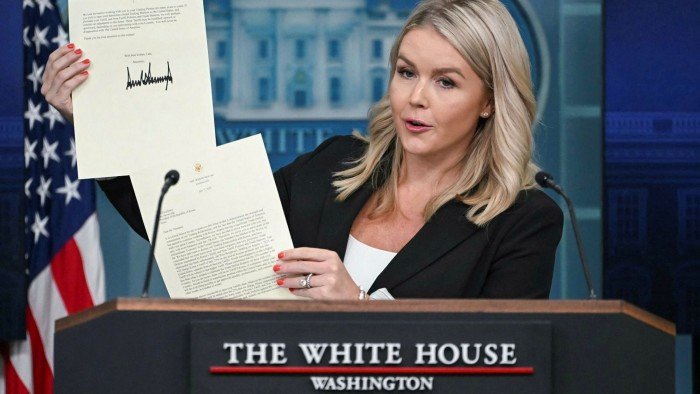This article is an on-site version of our FirstFT newsletter. Subscribers can sign up to our Asia, Europe/Africa or Americas edition to get the newsletter delivered every weekday morning. Explore all of our newsletters here
Today’s agenda: Rotterdam port readies for Russia war; Shein files for Hong Kong IPO; OpenAI beefs up internal security; French dealmaking’s American challengers; and vulnerable US universities
Good morning. We begin in Washington where Donald Trump has revived his threat to hit major trading partners with steep “reciprocal” tariffs even as he granted a three-week reprieve for countries to negotiate trade deals with the US.
What happened: The US president sent letters to Japan and South Korea, both among the biggest US trading partners, saying 25 per cent levies would be imposed from August 1. South Africa would be hit with 30 per cent tariffs, Trump said, as he announced big levies on 11 other countries.
The tariffs were roughly on a par with those Trump unveiled during his “liberation day” announcement on April 2, which had prompted severe ructions across global financial markets.
The reciprocal levies, which affected dozens of countries, were partially paused until July 9, steadying markets. But since then the White House has struck just three trade pacts — with the UK, China and Vietnam. Trump yesterday left the door open for further deals, saying that the letters were “more or less final offer[s]”.
Market reaction: The S&P 500 ended down 0.8 per cent yesterday, but Asian markets were unfazed by Trump’s tariff threats. Japan’s Topix edged up 0.1 per cent and South Korea’s Kospi rose 1.4 per cent. The yen was flat, trading around ¥145.90 per dollar, while the South Korean currency strengthened 0.7 per cent to Won1,365.6. The US dollar index weakened 0.2 per cent.
-
‘We don’t want an emperor’: Leaders at the Brics summit of developing nations have lashed out at Trump’s latest tariff threat and vowed to redouble efforts to move away from the US dollar.
-
Critical minerals: China’s export controls on rare earths and magnets have proved so much more effective than prior economic sanctions. Chris Miller, author of Chip War, explains why.
Here’s what else we’re keeping tabs on today:
-
EU: The bloc’s finance ministers meet in Brussels.
-
UK: King Charles III and Queen Camilla host French President Emmanuel Macron and his wife Brigitte Macron at Windsor Castle at the start of a three-day state visit. Macron is due to address parliament in Westminster before dining with the royal family.
Five more top stories
1. Exclusive: Europe’s largest port is gearing up for a potential conflict with Russia by reserving space for ships carrying military supplies and planning where to divert cargo if war breaks out. The head of Rotterdam’s port authority also said it was coordinating with neighbour Antwerp on how to manage if British, US and Canadian vehicles and supplies arrived.
-
Military aid: Trump has said the US will send more weapons to Ukraine, less than a week after Washington abruptly halted deliveries of some critical weaponry for Kyiv.
2. Exclusive: Shein has confidentially filed for a Hong Kong initial public offering as the online fast-fashion retailer seeks to accelerate a drawn-out listing process and pressure the UK regulator into approving a London listing. Zijing Wu has the details.
3. OpenAI has overhauled security operations to protect its intellectual property from corporate espionage, following claims of spying by Chinese rivals. The changes include stricter controls on sensitive information and enhanced vetting of staff, according to people close to the $300bn artificial intelligence company. Read the full report.
4. The biggest US private equity firms have abandoned a controversial practice of hiring promising graduates about to start work at investment banks for roles due to begin years later. The move follows JPMorgan Chase chief executive Jamie Dimon’s announcement last month that the bank would terminate junior analysts accepting future-dated jobs.
5. UBS has made about 100 “goodwill payments” to Swiss customers after complaints about losses on foreign exchange derivatives that blew up in the wake of Trump’s “liberation day” tariffs, as it seeks to draw a line under the episode at a time of heightened regulatory scrutiny. Mercedes Ruehl has more from Zurich.
The Big Read
Since January 2020, the share of British homes with access to full-fibre broadband has risen to more than 78 per cent from 12 per cent, thanks to UK regulator Ofcom’s decision to boost competition in the sector. Here’s what’s behind the surprising success story.
© FT montage/Getty
We’re also reading and listening to . . .
-
Autonomous vehicles: If humans are such poor drivers, why can’t supposedly superior machines cope without them, Sarah O’Connor asks.
-
Algeria alarmed: New tensions with the United Arab Emirates, France, Russia and Israel have jolted an authoritarian regime determined to keep its influence in north Africa.
-
Tech Tonic 🎧: This season’s final episode tries to decipher the enigma that is Peter Thiel, looking both at his political philosophy and influence in Silicon Valley and beyond.
How can Africa balance growth with the shift to cleaner energy? Register for free to join policymakers, experts and leaders in an online discussion tomorrow.
Chart of the day
Dozens of universities across the US risk losing an estimated $1bn in collective tuition fees from new international students unwilling or unable to study in the country as a result of actions by the Trump administration. Here are the institutions that are most vulnerable.
Take a break from the news
More executives have been incorporating hot yoga into the working day. Enthusiasts say high-temperature sessions sharpen focus, improve health and offer a chance to build contacts. Is the yoga studio the next hot place for networking?
© FT montage/Dreamstime

